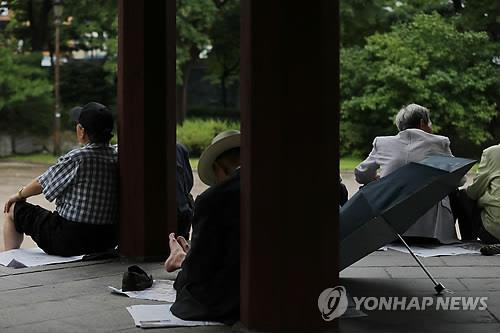Koreans aged 50 or older believe that they would need at least nearly 1 million won ($885) per month to maintain a basic standard of living after retirement, a report showed Friday,
According to a report released by the state-run National Pension Research Institute, Koreans aged over 50 think that they would need at least 990,000 won a month if they live alone and 1.6 million won if they have a partner for monthly living expenses after they retire.
 |
| (Yonhap) |
The study was based on a 2013 survey that interviewed 5,110 Korean households with a family member aged over 50, it said.
The “adequate” amount of monthly living costs on average was 1.4 million won per month for singletons and 2.25 million won for couples, the report added.
Nearly 51 percent of the respondents aged over 50 said they were not financially independent and were being supported by family members and the government.
Though half of them were financially underprepared, the majority of the surveyed, or 63.9 percent, still viewed themselves as most responsible for their financial situation after retirement.
Those who consider themselves to be entering retirement are mostly living on money provided by their offspring and relatives, followed by government‘s subsidies, pensions and wages for labor.
Around 80 percent of those yet to retire were not prepared at all for their post-retirement life, which could worsen elderly poverty here.
In the plural response-based poll, only 19.6 percent of the respondents had a financial plan, with 50.4 percent of them contributing to the public pension scheme, 45 percent saving money in banks and 25 percent investing on real estate.
The biggest challenges facing the respondents in the run-up to their retirement were financial difficulties and health issues, according to the poll.
South Korea has the highest rate of impoverished elderly among the 34 developed nations, according to the 2013 OECD data.
The poverty rate among senior citizens in Korea aged 65 or older was 48.6 percent in 2011, meaning that nearly 1 in 2 retirees are living in poverty, according to the government statistics.
The early retirement does not help the growing elderly poverty. Though the official retirement age is set at 58 as of 2014, the average age Korean workers retired was 53.
Starting from next year, the government will require the public sector and employers with 300 or more employees to extend the retirement age to 60 as part of efforts to improve job security and curb senior poverty.
By Ock Hyun-ju (laeticia.ock@heraldccorp.com)



